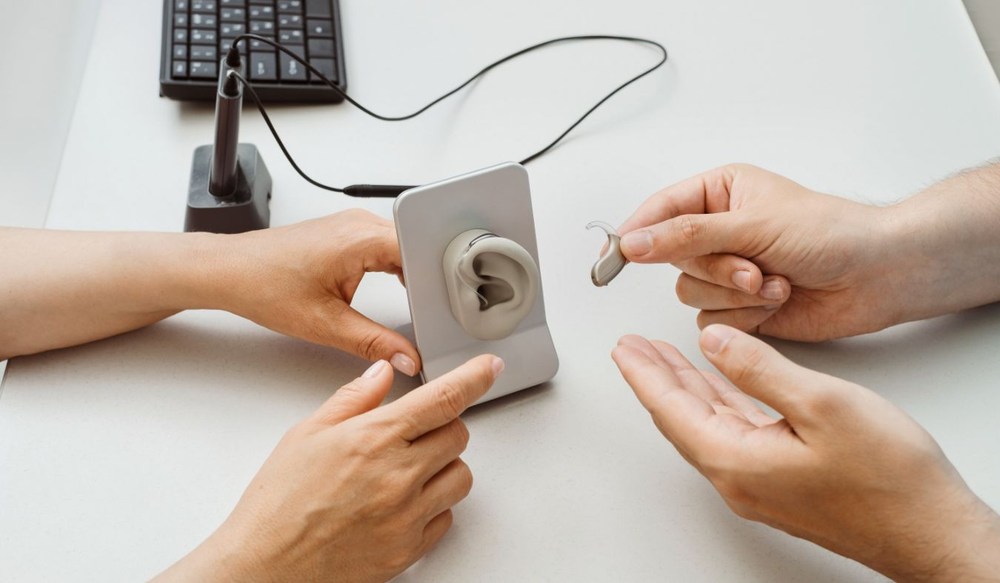The Impact of 5G on Hearing Aid Technology
As 5G wireless networks expand and become more widespread, you might

By: admin | September 25, 2024
Social events are full of conversations, laughter and music. For those experiencing hearing loss, these occasions can sometimes be a bit challenging. But it’s not just about catching every word; it’s also about feeling connected and involved in the moment. Learning to enjoy social gatherings with hearing loss is a skill that can be developed over time. While it might seem intimidating at first, there are strategies to help you enjoy these gatherings without missing a beat. Hearing loss doesn’t define you or limit your ability to engage socially – rather it presents an opportunity to explore new ways of experiencing the world around you.
Going to social events when dealing with hearing loss may initially seem like a hurdle. However, with the right approach and a few adjustments, you can fully participate in these occasions.
Did you know that nearly 48 million Americans have some degree of hearing loss? Despite this significant number, many people successfully attend social events by implementing strategies such as positioning themselves in quieter areas of the room or reading visual cues from the conversation. With practice and patience, handling social situations becomes more manageable over time.
Background noise during gatherings can often be a challenge for those with hearing loss. The constant hum of chatter, clinking glasses and music can make it difficult to focus on individual conversations.
Studies show that 70% of people with hearing loss report difficulty understanding speech in noisy environments. However, by using certain strategies such as positioning yourself closer to the speaker or using assistive listening devices, you can significantly reduce the impact of background noise and enjoy your social interactions more fully.
Selecting the right position at social events can make a big difference in how well you hear and enjoy the conversation. Background noise, overlapping voices and large spaces can make it difficult to focus, but a few strategic moves can help you hear better. Start by positioning yourself in a quieter part of the room, away from loudspeakers, music or kitchen areas where noise tends to be higher. Opt for seating where your back is to the wall; this will help reduce the sound coming from behind you, allowing you to focus on the people in front.
In group settings, try to sit near the center of the conversation, where you can more easily see everyone’s faces and read visual cues like lip movements and expressions. If possible, choose well-lit spaces, as this makes it easier to see and follow the flow of dialogue. Being mindful of where you sit and who you’re closest to can greatly improve your experience at social gatherings, ensuring you stay engaged and connected.
Attending a lively social event when you have hearing loss is one thing, but understanding the conversation is another. It’s not just about hearing the words, but also about understanding them in context. This is where mastering certain communication techniques can make a significant difference.
The first step towards better understanding is to ensure that you are facing the person speaking. This allows you to pick up on visual cues and facial expressions which often provide additional context to what’s being said. Similarly, if you’re in a group setting, try to position yourself where you can see everyone’s faces.
Another technique involves asking people to rephrase rather than repeat what they’ve said. Sometimes, hearing the same sentence with different words can make it easier for your brain to process and understand the information. It’s okay to ask for clarification – it shows that you’re actively engaged and interested in the conversation!
For individuals with hearing loss, social cues and body language play a crucial role in communication, especially in noisy environments like social events. When hearing is limited, visual signals become essential for understanding the conversation. Facial expressions, gestures and lip movements can help you grasp the context and emotion behind what’s being said, even if certain words are missed. Paying close attention to these non-verbal cues can bridge gaps in communication and keep you connected to the conversation.
Body language also provides vital clues in group settings. By observing how people lean in, shift their gaze or respond with subtle nods, you can stay in tune with the flow of interaction. These cues offer context that enhances your ability to follow along, even when background noise makes hearing difficult. Relying on visual communication not only reduces the frustration of missed words but also deepens your engagement with those around you, fostering stronger social connections despite hearing challenges.
Using hearing aids at social events can significantly enhance your ability to participate and enjoy conversations in noisy environments. Modern hearing aids are equipped with advanced technology designed to filter out background noise, amplify speech and improve clarity, making it easier to focus on the voices you want to hear. Features like directional microphones and noise reduction allow you to concentrate on the speaker in front of you while minimizing distractions from surrounding chatter or music. This can help reduce the strain and fatigue that often come with trying to listen in a busy setting.
Additionally, many hearing aids have customizable settings that can be adjusted for different environments. Whether you’re at a small gathering or a large event, switching to a more suitable program can enhance your listening experience. Pairing your hearing aids with accessories like remote microphones can further improve sound quality by sending audio directly to your devices.
Having hearing loss doesn’t mean you should struggle in silence. Expressing your hearing needs to others effectively is an important part of managing social situations.
It’s surprising to learn that only about 20% of those who could benefit from a hearing aid actually use one. This fact highlights the importance of communicating your needs to others, which can lead to better understanding and support in social environments. Being open about your hearing loss not only encourages empathy but also prompts others to communicate with you in a way that makes conversations more enjoyable for everyone involved.
Attending social events with hearing loss can sometimes lead to a unique kind of exhaustion known as listening fatigue. This happens because you’re constantly concentrating on deciphering sounds and speech, which can be mentally draining. However, there are ways to manage this fatigue and still enjoy your time at these events.
Tips to help you cope:
Are you ready to make your next social gathering even more enjoyable? Consider the power of taking regular breaks. This simple strategy can be essential in managing overwhelm at busy events.
Imagine this: You’re at a bustling family reunion, filled with laughter and lively chatter. The noise level is gradually rising, and you find yourself working harder to keep up with the conversations around you. This is when taking a short break can be incredibly beneficial. Stepping away from the crowd for a few minutes allows your brain to rest, reducing the risk of listening fatigue. When you return, you’ll likely find it easier to engage and enjoy the event without feeling overwhelmed.
Experiencing hearing loss doesn’t mean you have to miss out on the joy of music. Music is a universal language that speaks to our emotions, memories and spirit. It’s an integral part of many social events and personal moments. While hearing loss may change how you experience music, it doesn’t eliminate the pleasure it can bring. Adjustments might be needed, but they can lead to a whole new way of enjoying your favorite tunes.
In fact, many people with hearing loss continue to find great enjoyment in music. By adjusting the bass or treble settings or using assistive listening devices, you can enhance your musical experiences. Life with hearing loss is not about giving up what you love – it’s about finding different ways to experience it.
In today’s digital age, smartphone apps have become a powerful tool in managing and improving hearing health. These apps offer a range of features designed to enhance your listening experience and make daily communication easier.
For instance, some apps can amplify sounds, making it easier for you to hear conversations in noisy environments. Others can provide real-time captions for phone calls, ensuring you don’t miss a word during important conversations. There are even apps that can turn your smartphone into a remote control for your hearing aids, allowing you to adjust settings according to your environment.
Using these smartphone apps not only provides practical benefits but also empowers you with greater control over your hearing health. By leveraging technology in this way, you’re taking proactive steps towards better hearing and improved quality of life. So why not give these innovative tools a try? They could be the key to transforming how you manage your hearing health.
As you prepare for future social events, creating a personal plan can be your secret to success. This involves understanding your unique hearing needs and figuring out what strategies work best for you.
One key aspect of this plan could be identifying the types of environments where you hear best. For example, if you find it easier to follow conversations in quieter settings, consider seeking out these areas during events. Or if certain assistive listening devices have proven helpful in the past, make sure to bring them along.
Another important part of your plan is communication. Letting others know about your hearing loss and how they can help facilitate better conversation is important. This could mean asking them to speak slower, or face you directly when speaking.
By creating a personal plan like this, you’re setting yourself up for more enjoyable and stress-free social event attendance in the future!
Attending social events with hearing loss doesn’t need to be overwhelming. With the right strategies, you can enjoy these occasions fully, feeling connected and involved in every moment. If you’re seeking further guidance on having your hearing loss addressed, our team at The Audiology Offices is here to help. You can reach us at one of the following convenient locations:
Tags: hearing loss and mental health, hearing loss symptoms, types of hearing loss

As 5G wireless networks expand and become more widespread, you might
By: admin | November 18, 2025

As people grow older, attention often goes to staying physically active,
By: admin | September 24, 2025

The Audiology Offices and the American Academy of Audiology Reminds the
By: admin | September 23, 2025
